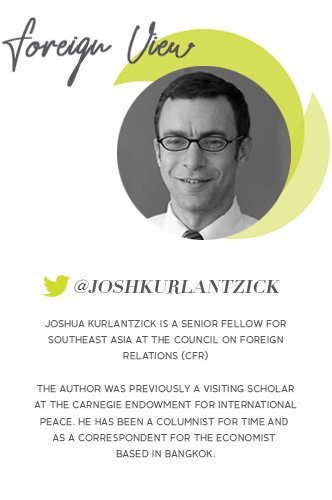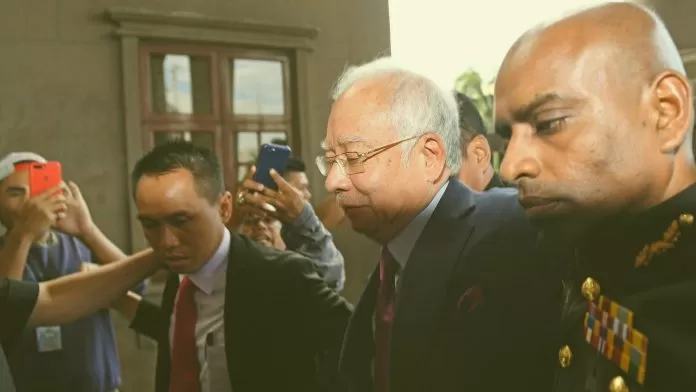 [dropcap]L[/dropcap]ast week, the Malaysian government arrested former prime minister Najib Tun Razak on charges of corruption and criminal breaches of trust, in allegations related to the 1MDB state fund scandal. The charges were brought swiftly; the new Malaysian government has been in office less than two months, after winning elections in May that turned in part on voter anger at the perceived high levels of graft in Najib’s administration.
[dropcap]L[/dropcap]ast week, the Malaysian government arrested former prime minister Najib Tun Razak on charges of corruption and criminal breaches of trust, in allegations related to the 1MDB state fund scandal. The charges were brought swiftly; the new Malaysian government has been in office less than two months, after winning elections in May that turned in part on voter anger at the perceived high levels of graft in Najib’s administration.
Najib’s arrest, after years of rumors surrounding the 1MDB fund, and investigations into it by authorities in the United States and other countries, is certainly a major signal that the new, Pakatan Harapan government, intends to take steps to improve the rule of law, which had been deteriorating badly in Malaysia, especially between 2013 and 2018. A sign that corruption will be investigated at the very top levels provides an important point, going forward, that the Pakatan government intends to make inroads against impunity.
It is likely that, following the Najib charges, the government will pursue cases against other people allegedly involved in the 1MDB scandal, including Najib’s wife Rosmah Mansor, major 1MDB player Jho Low, and possibly multiple other individuals. This week reports surfaced that the Malaysian government had frozen the bank accounts of one of Najib’s children. Nile Bowie of Asia Times also recently reported that “Money laundering probes into 1MDB dealings are ongoing in at least six countries.”
However, simply pursuing charges against Najib, though an important signal of change, will not be enough to rebuild the rule of law in Malaysia. The Pakatan government must commit to broader reforms that institutionalize transparency and allow the public to know more about how government operates, while also taking steps to ensure that scandals like 1MDB do not become commonplace again. For one, the Pakatan government needs to make clear that it will reverse the tide of press repression, which peaked under the Najib government, allowing for the kind of press coverage that will help prevent graft in the future by digging deep into the affairs of the state. (Already, just since the May election, the once-boring Malaysian state press, which failed to probe the Najib administration seriously, has become much feistier, aggressively covering the 1MDB case.)
Prime Minister Mohamad Mahathir’s government also can begin to protect press freedom by amending the 2016 national security law, which the Najib government used to repress expression. It also can also do so by following through on Mahathir’s promises to abolish the Najib-era anti-“fake news” law, an obvious attempt by the Najib government to obtain a weapon against independent press reporting.
In addition, the Pakatan government should set a high standard for its own affairs. For one, it should make clear to the public, and to government ministers, that any serious reports of graft within the new government will be seriously investigated by the anti-corruption commission and any other relevant investigators. It also could bolster transparency by improving the country’s weak open government laws. Mahathir also should not block potential investigations by the anti-corruption commission into other prominent Malaysian politicians who have amassed significant wealth – like longtime Sarawak head Taib Mahmud – even if they are longtime allies of Mahathir himself. And the government should delve deep into the 1MDB scandal, not just investigating Najib but also looking into a broad range of senior officials who might have been involved in stealing from the state fund.
The Pakatan government, and Malaysia’s judicial system, also must ensure that the trial of Najib, and possibly of other people arrested in the 1MDB investigation, is beyond reproach. Najib, his counsel, and his supporters already have accused the government of pursuing a political vendetta against the former prime minister , and Najib has denied the accusations and pled not guilty in court.
As CNBC’s Nyshka Chandran has noted, the case is political, “given the long-standing animosity between Najib and Mahathir, his ex-mentor”; Mahathir openly said that he came out of retirement to lead the opposition in large part because he was dissatisfied with Najib and thought him corrupt. Bowie notes that, within UMNO, many people want to portray Najib as a martyr for Islam, a potentially explosive strategy in a country that already has deep ethnic and religious divides.
The new government, then, must oversee the trial of Najib – and the continuing investigation into lost 1MDB funds and other people involved in the 1MDB scandal – while not prejudicing the outcome. Despite his harsh rhetoric toward Najib on the campaign trail, and the public anger that built up against Najib (as well as Mahathir’s own tendency to unleash brutal sound bites), Mahathir should avoid publicly commenting on the Najib trial and ongoing 1MDB investigation. By refraining from commenting, he would allow the judge and prosecutors in the Najib case to handle the trial – and would avoid suggestions that the prime minister is somehow trying to predetermine Najib’s fate. One positive step that has been taken is that the Mahathir administration has removed direct control of the anti-corruption commission from the prime minister’s office, a signal that the anti-corruption commission will not, in the future, be subservient to the leader’s wishes.
Stepping back publicly from the 1MDB case will not be easy for Mahathir, who has spent his entire political career as one of the most outspoken leaders in Asia, but he will have to keep quiet on the Najib trial for the judicial proceeding to be legitimate. Not only Malaysian citizens but also the entire world will be watching how Mahathir’s government treats the Najib case, to see whether the Pakatan administration can reduce the politicization of Malaysian politics and, eventually, rebuild trust in the country’s institutions.
Events in Malaysia since the Mahathir coalition’s victory also offer insights for Indonesian politicians, who are struggling to make headway against corruption while also trying to ensure that anti-corruption investigations do not wind up looking like political vendettas. On the one hand, the fact that combating graft was a major factor in the Mahathir coalition’s victory suggests that, in Indonesia too, where corruption in politics remains endemic, President Joko Widodo could take more aggressive steps to fight graft, and might be rewarded for his efforts in the 2019 election.
The Malaysia case also shows that it may take a graft case against an extremely high-ranking politician to begin to convince the public, whether in Malaysia or in Indonesia, that politicians and officials really have the will to tackle corruption. In the past, in both Malaysia and Indonesia, high-level politicians, officials, and army officers simply enjoyed impunity for any offenses. As James Chin of the University of Tasmania notes, “not a single top political leader [in leading Southeast Asian states] has been found accountable in a court of law” for many of the biggest, violent, abuses of the past in Southeast Asia. Simply seeing one or two top leaders face graft charges, though not sufficient to reform an entire system, does send a very important message to the public about a government’s seriousness in fighting corruption.
However, if the Jokowi administration does not make greater headway against graft, the opposition in the 2019 election could hold up Jokowi’s failure on corruption as a major reason to vote him and his allies out of office. And simultaneously, the Jokowi administration will, like Mahathir’s administration, need to work harder to institutionalize anti-corruption efforts, so that they are truly independent of political interference. It can do so by working more to give the KPK real independence, inoculate it from attacks from other bureaucracies and politicians – and ensure that the KPK, which is popular among the public, will strongly survive whoever wins the next presidential election.



